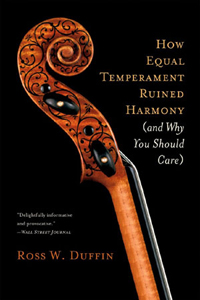| COURSE INFORMATION |
|---|
| Course Description: | Independent academic study for students in the Bachelor of Music (MUST 4212) and the Master of Music (MUSG 5336) Degree Programs.
This course is recommended for music theory and composition majors, but may be taken by any music major. |
| Location: | FFA Room M302 |
| Meeting Times | TR, 0930-1020AM (2012 ONLY) |
| Prerequisite: | Senior-level standing (MUST 4212) or Graduate standing (MUSG 5336) |
| INSTRUCTOR INFORMATION |
|---|
| Name: | Charles Leinberger |
| E-mail: | CHARLESL@UTEP.EDU |
| Office: | Fox Fine Arts Center, Room M432 |
| Office Phone: | (915) 747-7800 |
| Office Hours: | Charles Leinberger's Office Hours |
| Biography: | Charles Leinberger's Biography |
| TEXTBOOK |
|---|
| Textbook/Workbook: | Ross W. Duffin, How Equal Temperament Ruined Harmony |
 |
| The instructor will provide all additional handouts. |
| Calculator: | Texas Instruments TI30XA, TI-30X IIS, or any calculator capable of logarithms. |
| COURSE GOALS, OBJECTIVES, OUTCOMES, ETC. |
|---|
| Course Goal: |
To provide the student with the theoretical knowledge and skills needed for success in a career in music performance, education, or composition. |
| Course Objective: |
Upon successful completion of the course, the student will be able to:
- Understand and appreciate the evolution of the four main tuning systems and their relationship to the history of musical composition and practice.
- Demonstrate a knowledge of the theorists who have advocated the various tuning systems throughout the centuries and their reasons for doing so.
- Calculate ratios and cents for all possible intervals in Pythagorean Tuning, Just Tuning, Meantone Temperament, and Equal Temperament,
including the various sizes of whole steps and half steps found in diatonic scales.
- Critically discuss the advantages and disadvantages of each tuning system.
|
| Teaching Philosophy: |
Charles Leinberger's Teaching Philosophy
|
| SCHEDULE |
|---|
| Week |
Days |
Topic |
Assignment |
Test |
| 1 |
T |
Duffin: Prelude |
Ratios, Cents, Overtones, Commas, Read Syllabus |
1, |
None |
| R |
2 |
| 2 |
T |
Duffin: Chapter 1 |
Pythagorean Tuning |
3 |
| R |
Just Tuning |
4 |
| 3 |
T |
Duffin: Chapter 2 |
Meantone Temperament |
5 |
| R |
Equal Temperament |
6 |
| 4 |
T |
Duffin: Chapter 3 |
Microtonal Tuning Systems |
None |
| R |
| 5 |
T |
None |
Review for Midterm 1 |
| R |
Midterm 1 |
Midterm 1 |
| 6 |
T |
Duffin: Chapter 4 |
Greek Music Theory, Greek Modes |
None |
None |
| R |
| 7 |
T |
Duffin: Chapter 5 |
Guido d'Arezzo (d. after 1033) |
| R |
Philippe de Vitry (1291-1361) |
7 |
| 8 |
T |
Duffin: Chapter 6 |
Jean-Philippe Rameau (1683-1764) |
None |
| R |
8 |
| SB |
Spring Break |
| 9 |
T |
Duffin: Chapter 7 |
Jean-Philippe Rameau continued |
None |
None |
| R |
Giuseppe Tartini (1692-1770) |
| 10 |
T |
None |
Review for Midterm 2 |
| R |
Midterm 2 |
Midterm 2 |
| 11 |
T |
Duffin: Chapter 8 |
Friedrich Wilhelm Marpurg (1718-95 |
None |
| R |
Johann Philipp Kirnberger (1721-83) |
9 |
| 12 |
T |
Duffin: Chapter 9 |
Georg Andreas Sorge (f. 1745-47) |
Begin Final Project |
| R |
Arnold Shönberg (1874-1951) |
| 13 |
T |
Duffin: Chapter 10 |
Paul Hindemith (1895-1963) |
None |
| R |
Walter Piston (1894-1976) |
| 14 |
T |
None |
Heinrich Schenker (1868-1935) |
Final Project Draft |
| R |
None |
| 15 |
T |
Review for Final |
Final Project Due |
| R |
None |
| Finals |
TBA |
Final |
None |
Final |


